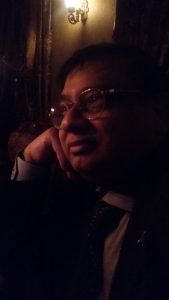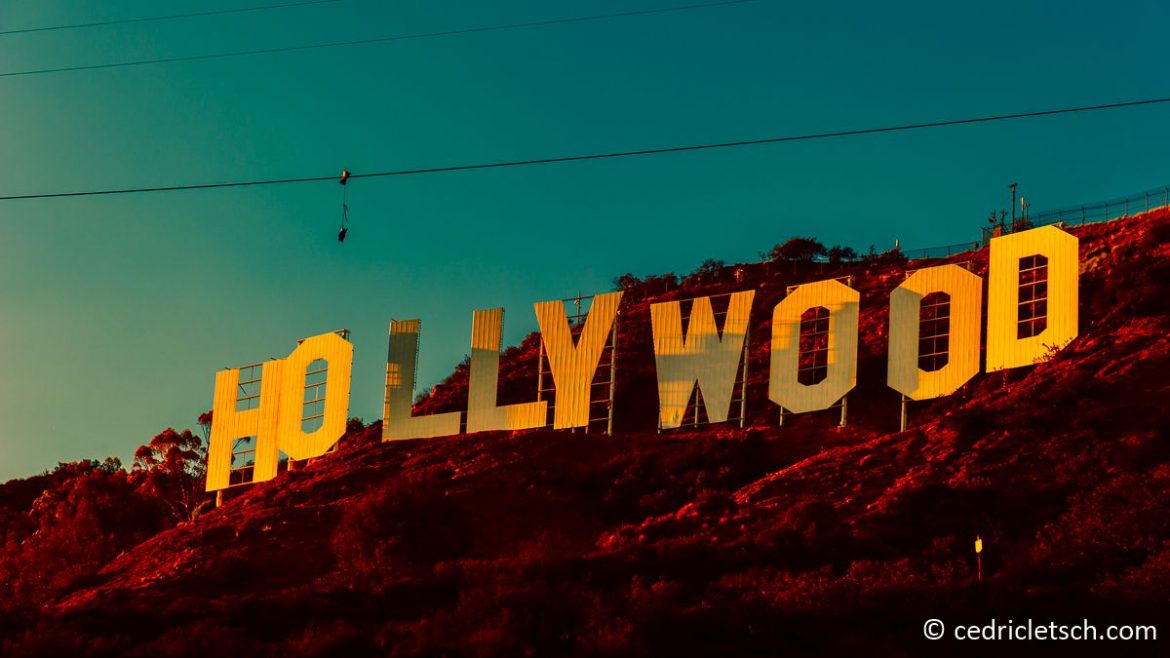
Prof. Santhi Jayasekera, PhD, Professor, réalisateur
Hollywood is “The dream factory”. Hollywood, the famous district in California, LA, is known worldwide as the main place of the American cinema industry. Here the majority of American films are shot, and a lot of celebrities live. On Hollywood Walk of Fame there are more than two thousand and a half hand imprints of movie, theatre and entertainment stars.
- The Appearance of Hollywood
Just before the cinema era, well-known Thomas Edison created at his lab the device for the demonstration of the moving figures, which gained the name “kinetoscope”, and he made the patent on it in 1893. With the appearance of the great amount of the devices by Lumière brothers and of the other European firms, Edison suffered under high competitiveness. He brought some cases to court, and, basing on the patent right, he tried to fight the competitors. When suddenly W. Dickson, the engineer, who took part in the construction of the kinetoscope, left the lab of Edison and in 1896 created his own lab named “Biograf”.
After the long fight at the end of 1907 Edison’s company gathered the biggest competitors and came to the compromise, according to that every has the right to use the patent on the condition that the half of the income from the cinema distribution is transferred to Edison, while the competitors made another suggest – to create the only company that would control the collection of percentages and at the same time would have the monopolistic right on the patent.
And so in 1909 “The Patent Company” was created, where nine participants were included.
Soon “The Patent Company” conquered more than the half of the American cinema distribution (57%).
Photosensitivity of film at those years was quite low, and there was no good lighting equipment. That is why the process of shot depended on the weather conditions: it was possible to shot only in the bright sunlight.
“The Patent War” and climate conditions made the film creators search the best place for the shot.
At the beginning of 1910 the company “Biograf” sent the film director David Griffith and his troupe (Blanche Swit, Lillian Gish, Mary Pickfod, Lionel Barrymore etc) to Los Angeles (California).
Griffith liked Hollywood with its picturesque landscapes, which was situated long from the city. And there he shot his first film called “In the old California”, the drama that takes place in the territory of the Mexican province California in the 1800-s.
The company of film people stayed there for several months and shot several films.
The mild climate in California and the abundance of sunlight that allowed to make films in the open air all the year – all these factors attracted almost all the filmmakers. The new kind of organization that creates cinema made an appearance – cinema studio.
The first studio in Hollywood was founded by the company “Centaur” situated in New Jersey. It was made for the shot of westerns.
In 1911 road house was remade into the cinema studio and got the name “Nestor Studio”.
Later on the building turned into “Hollywood Cinemalab”. The first full-length feature film made in a Hollywood studio was “The Squaw Man” (1914) by Cecil B. DeMille and Oscar Apfel.
In 1920 due to the dramatic growth of the range of the tremendous studios and celebrities, about 800 were shot annually, and the very name “Hollywood” became synonymous to luxury, beautiful life and illusionary cinema magic.
Within just 15 years a humble village turned into the capital of the cinema industry of the USA, as about 90% of studios were concentrated in it. Intense competition resulted in the collapse of smaller studios.
The large-scale groups emerged, so-called cinema trust. And those in turn merged with the film distribution companies.
In May 1912 the company “Paramount Pictures” was created by Adolf Zukor.
The target audience of the first films was middle class. Zukor shot such actors as Mary Pickford, Douglas Fairbanks, Gloria Swanson, Rudolf Valentino etc.
It was Zukor who was the main driving power in the success of “Paramount”. During the 20-s he managed to build the cinema chains, which numbers more than 200 screens and bring to light many new talents: Marlen Dietrich, Gary Cooper, the Marke Brothers, tango dancer Carlos Gardel. In 1949 as the time of TV came, it brought about the company “Paramount Pictures” to cut on the costs on the cinema production and draw up a contract on 50 million dollars for 750 pictures made before 1949. Within the next 40 years the company made more than 1 billion dollars on the distribution of the films previously perceived as useless.
In the spring 1919 four American cinema stars – the film director D.W.Griffith, the actor Charlie Chaplin, Douglas Fairbanks and Mary Pickford launched their own company- “United Artists Corporations”.
In the future the structure of founders will constantly change. Even the main founders stared to move away from their activity, and «United Artists” was supported by the independent cinema producers that were interested in the marketing channel of their own films in the conditions of the monopolistic studio system – their names were Walt Dusney and Orson Welles.
Because of the clashes between the producers till the end of 1930 “United Artists” practically went out of the business.
The most fortunate decade for the company was 60s, when Bondiana movies and the series of the films “The Pink Panther“One of the most successful films during the history of the studio became the musical “West Side history”
In 1967 the control over “United Artists” passed to to the investment company “Transamerica”.
After the flop of the block-buster film “Heaven’s Gate” in 1980, the company was put up for sale. The owner of MGM, the billionaire Kirk Kerkorian, highly interested in the rights on the old films of the studio, acquires «United Artists” and practically joins it to MGM.
The media company famous world-wide was opened by the owner the cinema chain, Markus Lev.
In 1924 he organized the merger of the three cinema companies – Metro Pictures”, “Goldwyn Pictures” and “Louis B. Mayer Pictures” to the one with the name “Metro-Goldwyn-Mayer”.
This company became the first cinema producer of its kind in the world.
The mascot of the new company became the growling lion of Goldwin’s studio, “Leo the Lion”, which appeared on the cinema screens in 1916, and the new motto of the company was “Art for the sake of art”. Meier was appointed as the head of the cinema production. The first Meier’s task was to finish the major film in the history of the cinema – “Ben-Hur: A Tale of the Christ”. The triumph of this film allowed MGM to have the status of the best Hollywood studio and have the first place in the “Big Five” of cinema producers.
In 1928 Meier released the first full-length color film with the audio track “Viking”. Starting from 1938 the studio released at least 2 films in color.
The most successful projects at MGM were cartoons, which were made in the 40-s and such masters as Tex Avery, Harman Ising and Hanna-Barbera (Tom and Jerry cartoons) worked on them.
The end of the 50-s the mass spread of TV causes the outflow of the audience from the cinema. After four years the company registers the losses. From this moment MGM had seen a progressive and inevitable decline, accompanied by the reduction of the market share.
In 2010 MGM declares itself bankrupt with the debt of 4 billion dollars.
Under company’s belt are 205 Oscars, with 15 of them in the category “The Best Film”.
Warner Bros. Company was named after the four Warner brothers (Harry, Albert, Sam and Jack), who emigrated from Poland to the USA, and is one of the biggest concerns on the film and TV series production.
In 1904 the brothers spread the films on the territory of the four states, and to 1918 they opened the studio Warner Bros. Studio and started to produce their own films.
In 1927 the sound film “The Jazz Singer” was released, with the sound effects. It caused a real sensation and marked the beginning to the “speaking pictures era”.
In 1928 the brothers released the film “Lights of New York” with the full audio track. From this time all the cinema industry turns to the films with the sound. The color film “Gold Diggers of Broadway” marked the beginning of the color film epoch.
The period between 1929-1931 is the time of color musicals: “Sally”, “Bright Lights”, “West Song”, and “Under a Texas Moon”.
In 1931 the series of cartoons – Looney Tunes –funny sketches with jazz soundtrack.
At that years the cartoons about Bugs Bunny and Duffy Duck, and later on the cartoon “Tom and Jerry”.
Today the company is called Time Warner. The following films were made at this studio: “Green Mile”, “Matrix”, “Inception”, “Devil’s Advocate”, “Sherlock Holmes” and the series of the films about Harry Potter.
The target of the cinema production was the mass audience, and that was a tremendous limit to the freedom of the film director as to the master. The system required “the show” that would bring more profit, and it were actors-celebrities and producers that got the privilege, not film directors.
The future celebrities had special preparation at cinema studios, and PR-industry was working on the celebrities’ image. The notion of a celebrity in Hollywood emerged in the 20s and reached its blossom in the 40s-50s. And just in the 70-s with the collapse of studio system stars become more independent and free from the control of cinema studios, they started to create their own image and choose the repertoire of the films they are going to be featured, and even started to make their own contribution to the development of the different genres.
One of the main achievements of Hollywood is connected to the elaboration of such interesting genres as:
– comedies by M. Linder, C. Chaplin, B. Keaton, G. Lloyd
– dramas with Rudolf Valentino
– westerns by David L. Ford
– “black” films with Humphrey Bogart
– musicals with Freddie Astaire and Gene Kelly
– thrillers by Alfred Hitchcock
And so on right up to the fantasy, action films and box-office hits of the recent times: all these genres live and appear to satisfy the mass audience, leaving the narrow self-expression frames for a film director.
The modern period. It unfolds with the studio system collapse form the beginning of the 60s. The interest for the traditional cliché films with the celebrities was steadily declining. Studio bosses tried to attract the new film directors-experimentalists: George Lukas, Steven Spielberg, Martin Scorsese, and Francis Ford Coppola.
It was this group of film directors that formed the modern cinema. Their films were a big success that determined the appearance of the new notion “box-office hit”. The new wave of the new, unordinary and candid cinema in the 70s found its own audience, and the brand new stage in the American cinema broke out.
A more detailed attention should be paid to the so-called “independent American cinema”. This term was used at the beginning of the 21st century to mark the American cinema studio that exists independently from the American major companies. This kind of cinema is characterized by creative experiments and minor budget of the film.
Unlike Hollywood, independent American cinema is less popular is less popular in America than in Europe and Canada.
The term “independent cinema” could be referred to any country of the world: France with its “New Wave” in the 60s, Italy with its “Neorealism” after the world war period. The majority of the home cinema of the Perestroika period (Soviet and later Russian) could be referred to this category.
But the term “independent cinema” fits more to the American cinema industry, with its evident contrast between the big, rich Hollywood cinema and small and poor, but not less talented, independent cinema. The film directors of the independent cinema can have dare experiments, sometimes rejecting the conservative values, prejudges and political taboos. Even sex scenes sometimes fling cap over the windmill.
In contract to the Hollywood cinema (palm trees, beaches) “independent cinema” always takes place in some concrete jungles in the big cities of America. Independent American cinema appeared in the 40s. The most prominent film director of the 40s-50s was Jonas Mekas.
Truly “independent cinema” appeared at the moment as the films by Quentin Tarantino and the Coen brothers came into fashion.
Another “independent film director”, Andy Warhol, strongly believed that every human has the right on the 15 minutes of fame. His “film screen test”, the series of three-minute portraits, forms the impression of interaction, which is very typical of some films by John Cassavetes.
One of the most significant events that had an impact on the development of the independent cinema was the release of the film “Easy Rider”, produced by Roger Corman and directed by the actor Denis Hopper.
By his road thriller “Wild angels” Roger Corman anticipated the rebellious wave in the cinema of the 60s.
Roger Corman’s workshop on AIP studio prepared many famous film directors such as Francis Ford Coppola, Martin Scorsese, Jonathan Demme, James Cameron etc.
A huge impact on the development of the American independent cinema had the work by Francis Ford Coppola – a pupil of Roger Corman.
With his adherents George Lukas, John Milius, Walter Murch he founded the cinema studio American Zoetrope in San Francisco.
The first picture at this studio was “ТНХ 1138” by George Lukas.
It was a tremendous event for the independent cinema that determined the new stage in its development. And today this work serves as a good example of a good fantasy.
Another prominent person in the independent cinema was Samuel Fuller. His masterpieces in different genres had a direct influence on the creative work of such outstanding film directors such as Martin Scorsese, Vim Vanderson (Germany), and even the works by Godar (France). This once again reminds about the close interaction between the independent film directors from America and Europe.
The 80s saw the new cult figure, David Lynch, who always tried to find the balance mysticism with fantasy, turning the flight of fancy of the creator into a pure avant-garde. David’s Lynch style of making thrillers is unique, and many film directors tried to imitate it, but nobody has really reached it yet.
Let us name some famous film directors of the independent cinema and some of their films:
– Steven Spielberg “Jaws” (1975);
– George Lukas “Star Wars” (1977);
– David Lynch “Eraserhead” (1977);
– Francis Ford Coppola “Apocalypse Now” (1979).
The popularity of these films was global. And the film gave rise to the subculture in the youth culture.


